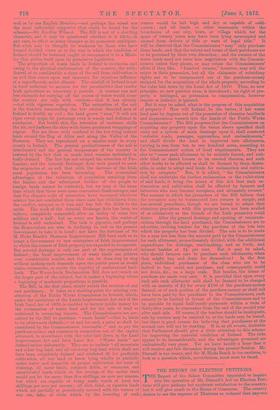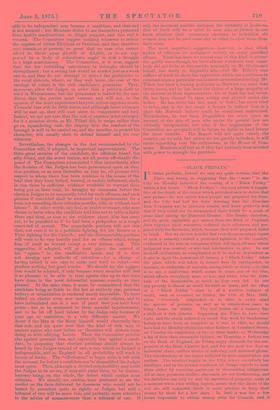1.111, REPORT ON ELECTION PETITIONS.
THE Report of the Select Committee appointed to inquire inte the operation of Mr. Disraeli's Act on Election Peti- tions will give perhaps but moderate satisfaction to the country, but it will give much to the House of Commons. The country desires to see the expense of Elections so reduced that any-one able to be independent may become a candidate, and that end is not secured ; but Members desire to see themselves protected from hostile machinations or illegal support, and this end is secured. The Committee suggest nothing whatever to reduce the expense of either Elections or Petitions, and they therefore may remain as at present, so great that no man who cannot afford to throw away £4,000 or £5,000, or is not sup- ported by a body of subscribers, ought to risk a struggle in a large constituency. The Committee, it is true, suggest that the law forbidding conveyance in boroughs should be strengthened ; but a strong law would be evaded just as a weak one is, and they do not attempt to extend the prohibition to the rural districts, where, as they well know, the cost of the carriage of voters is the rich candidate's guarantee. They, moreover, allow the Judges to order that a petition shall be tried in Westminster, but the permission is loaded by the con- dition that the parties must consent, and will not, in the opinion of the most experienced lawyers, reduce expenses much. Counsels' fees will be little lower, and although fewer witnesses will be sent up, they will cost more to compensate and feed. Indeed, we are not sure that the risk of expense is not enlarged, for if a member elects' as Mr. Tillett did, to resign rather than go on squandering cash, the inquiry into the conduct of the borough is still to be carried on, and the member, to protect his character, will usually elect to defend himself and his con- stituency.
Nevertheless the changes in the Act recommended by the Committee will, if adopted, be important improvements. The three great enemies of the candidate, the officious friend, the silly friend, and the secret traitor, are all pretty effectually dis- posed of. The Committee recommend "that immediately after the decision of the Judges has been pronounced upon an elec- tion petition, or as soon thereafter as may be, all persons with respect to whom there has been evidence in the course of the trial that they have bribed, treated, or unduly influenced, shall, in case there be sufficient evidence available to warrant their being put on their trial, be brought by summons before the election Judges to be summarily tried for such offences, and such persons if convicted shall be sentenced to imprisonment for a term not exceeding three calendar months, with or without hard labour." In other words, any fool, or zealot or enemy, who may choose to bribe when the candidate told him not to bribe is liable there and then, as soon as the evidence about him has come out, to be punished as if he had been a pickpocket or a rough convicted of assault. The respectable partisan will not risk that, not even if he is a publican fighting for his licence or a Vicar fighting for his Church ; and the disrespectable partisan will want to be very heavily paid for an offence which brings him of itself no reward except a very serious risk. This suggestion, if adopted, will at least place the control of his " agents " in the candidate's hands, and if it does not develop new methods of extortion—for a charge of having bribed is one easy to make and hard to rebut—can produce nothing but good results. We should say the sugges- tion would be adopted, if only because every member will feel it so pleasant to be able to trust agents who up to this time have done, in the most deferential manner, exactly as they pleased. At the same time, it must be remembered that the -candidate being as liable to the law as anybody else, personal bribery or intimidation is rendered nearly impossible. To have bribed an elector even now carries no social stigma, and to have intimidated one is a sort of proof that you have local power ; but to be sentenced to three months' imprisonment, and to be let off hard labour by the Judge only because of your age or contrition, is a very different matter. We doubt if the Man in the Moon himself would cheerfully face that risk, and are quite sure that the kind of rich man or ancient squire who now bribes or threatens will abstain from doing so with edifying horror. Then the Committee provide also against personal bias, and especially bias against a candi- date, by proposing that election petitions should always be heard by two Judges instead of one a rule which in Ireland is indispensable, and in England in all probability will work in favour of lenity. The "off-chance," to begin with, is left with the accused, for before a candidate can be disqualified the Judges must agree. Then, although a divided responsibility may assist the Judges to be severe, it may also assist them to be lenient, leniency being, on the whole, the defect which excites most criticism. We should, we confess have preferred to see the verdict on the facts delivered by Assessors who would not be bound by precedent quite so rigidly as Judges, bot still a tribunal of two will be more fair, and probably more attentive to the advice of common-sense than a tribunal of one. If only the increased number increases the certainty of decisions, that -of itself will be a relief to men who at present do not know whether their customary charities to bedridden old women may not be used some day or other to eject them from their seats.
The most important suggestion, however, is that which makes of officious or malignant bribery an easily punished offence. There has been no crucial ease of this kind to attract the public ear—though we have always wondered that some- body did not bribe at Greenwich, nominally on Mr. Gladstone's behalf, but really to disqualify him—but Mr. Tillett's case suffices of itself to show the oppression which can sometimes be exercised when a particular candidature arouses local feeling. Mr. Tillett has been a leading politician in Norwich for more than thirty years, and he has been the choice of a large majority of the electors as their representative for at least the last seven. He has been elected by open voting and elected under the ballot. He has never had any need to biibe, has never tried to bribe, and is far too acute a lawyer to believe that in a place like Norwich bribery could be sanctioned undetected. Nevertheless, he has been disqualified for seven years on account of the acts of men who under the present law are virtually irresponsible, but who, if the suggestions of the Committee are accepted, will in future be liable to hard labour for three months. The Report will not quite satisfy the country, as we said, but unless we are greatly mistaken, it will excite something very like enthusiasm in the House of Com- mons. Members will feel as if they had suddenly been invested with power to strangle the garotters.



































 Previous page
Previous page